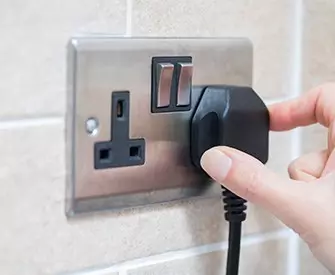A common question about power generators is: What Generator Will Provide Emergency Power To A House? We discuss below, the types of generators available and which is the most suitable for powering a house during an emergency outage.

There are many reasons that someone should want to buy a home standby generator. They are standard hardware that any household that is prepared for power outages will own.
Particularly, homeowners who live in rural areas know only too well the necessity of a standby generator. Power outages can occur at any time through weather disturbances, so having a whole house standby generator on, well, standby, is the best way to stay prepared.
These outages are far more common than people think, and by having a standby generator, you can ensure that your wait for the power to come back on is not mired in darkness and cold.
Outages might last for several days, in which case you can say goodbye to the food in your freezer. More crucially, if you are a business owner, it can be a devastating tragedy that could cost you a lot of money when the power goes.
All of these reasons demonstrate why it is so important to own a standby generator. Having an emergency backup generator for your power supply is also necessary if you live in an area that experiences extreme weather, again a leading cause of power outages.
Providing your home with a backup generator will allow you to mitigate the effects of a power outage so that you can continue to live and work comfortably whatever happens. Solar generators are not the same as a standby generator, as they serve as your home's primary source of power, so don't confuse the two.
Of course, not all generators are the same, and different types of generators will perform differently on your property when you need them.
What is a standby generator?
The primary determination that denotes a generator as a standby generator is fuelled by liquid propane or natural gas. These generators are connected to existing gas lines rather than independent sources such as gas or propane tanks.
They are equipped to provide power automatically when the main source fails, saving your home or business from experiencing an interruption to your power supply, allowing you peace of mind. In most cases, backup power generators can begin to provide secondary power 30 seconds from your primary source, failing.
They can do this by connecting to a transfer switch that automatically turns the standby generator on without you having to do a thing. Conversely, you will manually have to switch on a portable generator when your main power source fails. Portable generators are also limited in the power they supply.
While a standby generator will be able to power the entirety of your home or business, portable generators may only be able to provide power to one or two devices.
What is a standby generator used for?
Standby generators, as previously mentioned, act as a secondary power source for homes or businesses when their primary power source is interrupted.
They are becoming increasingly essential for companies that rely on consistent power to provide their services, such as banks and distribution centres. A consistent supply of power is crucial for these businesses to ensure their continued service for their customers.
Therefore, backup generators provide a brilliant contingency to power failures. In a more practical sense, standby generators are sturdy commercial engines.

They are mounted on a skid unit and contain an onboard fuel tank, alternator, radiator and independent electronic controls. They are often housed underneath a weatherproof cover or in a specifically constructed building.
Any standby system must be able to activate at any time, no matter the conditions. To carry out this automatic activation, standby generators are connected to the electricity mains supply via an Automatic Transfer Panel, also called an 'AMF', meaning that a trained electrician is needed to install them. This connection allows the generator and its independent electronic controls to monitor the power supply from the National Grid and chart any variation or fluctuation in that supply.
If a significant deviation is sensed, the AMF will send an automatic and instant signal to the generator to start. This will provide an uninterrupted output supply of electronic power regardless of any failures in the mains supply.
What is the cost of a standby generator?
Given that standby generators vary in size and power, determining a specific price for any standby generator is impossible. As a general rule, the final cost of the generator, once installed, will typically double the generator's price on its own. There are also two different operating systems for standby generator engines.
These are air-cooled generators, smaller and cheaper but louder, and liquid-cooled, which are larger. In general, a 22-kilowatts emergency backup generator will be sufficient to power an average-sized home, especially if the house relies less on electrical energy and has gas-powered heating.
Air-cooled generators of this size will cost around £3,500, coming to £7,000 once installed. Larger, liquid-cooled generators of a 22-kilowatts size will cost between £7,000 and £10,000, and again, once installed, these generators will cost around £14,000 - £20,000.
While these generators seem expensive, especially when you bring the installation costs into the equation, they are worth the investment. The guaranteed power offered by standby generators will help keep your family home going when your primary source of power is disrupted. Additionally, backup generators are a necessity for businesses that rely on a consistent supply of electrical power. Therefore, you can see how standby generators are worth the cost.
Is a portable generator a more cost-efficient alternative?
One alternative type of generator to a permanent, dedicated standby generator is the use of portable generators. These portable versions of electronic generators are far cheaper than backup generators, coming in anywhere between £400 - £1,500.
However, given that these generators are portable, they are far smaller and generate far less power than a dedicated standby generator. Portable generators can be used to power lights, a television, septic pumps, a refrigerator or a water heater. Still, they can not deliver the power necessary to run an entire house or company building.
As previously mentioned, whereas a standby generator can automatically begin providing power to your property once the primary source is disrupted, a portable generator must be started manually and, therefore, will not provide a consistent, uninterrupted supply of electrical power.


Portable generators also require power extension chords to be run from the generator to the appliances you want to power. These cables could pose a potential health and safety risk, especially if you find yourself without lighting during a power outage blackout.
An additional drawback to using portable generators is the need to power them manually. These generators require you to power them with gas or diesel, while standby generators can be connected straight to your primary source of natural gas power for your home.
Therefore, emergency backup generators save you the hassle and money of providing independent sources of diesel power that you would otherwise have to provide with a portable generator. Portable generators can also be far more dangerous than standby generators.
You must ensure that your portable generator is adequately ventilated while it is in operation. If the generator's air ventilation is obstructed, then you run the risk of carbon monoxide poisoning.
When you are thinking of buying a standby or portable generator, overall, you can see how standby generators are a far superior option when looking at alternative power sources for your home or business. While they are more expensive, their consistent power delivery, automatic operation, safety, utility and versatility make them a far better option than portable generators.
Are you thinking about whether you should buy a standby generator? If you are looking for reliable standby generators for sale, we provide the best brands with UK wide delivery.





